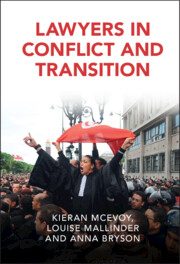Book contents
- Lawyers in Conflict and Transition
- Cambridge Studies in Law and Society
- Lawyers in Conflict and Transition
- Copyright page
- Dedication
- Epigraph
- Contents
- Acknowledgements
- Abbreviations
- Chapter 1 Lawyers in Conflict and Transition
- Chapter 2 Cause Lawyers, Political Violence, and Professionalism in Conflict
- Chapter 3 Boycott, Resistance, and the Law
- Chapter 4 Gender and Cause Lawyering in Conflicted, Authoritarian, and Transitional Societies
- Chapter 5 Government Lawyers in Conflict, Repression, and Transition
- Chapter 6 Lawyers in Transitional Political Negotiations
- Chapter 7 Lawyers, Transitional Justice, and Dealing with the Past
- Chapter 8 Conclusion
- Appendices
- Bibliography
- Index
- Cambridge Studies in Law and Society
Chapter 5 - Government Lawyers in Conflict, Repression, and Transition
Published online by Cambridge University Press: 17 March 2022
- Lawyers in Conflict and Transition
- Cambridge Studies in Law and Society
- Lawyers in Conflict and Transition
- Copyright page
- Dedication
- Epigraph
- Contents
- Acknowledgements
- Abbreviations
- Chapter 1 Lawyers in Conflict and Transition
- Chapter 2 Cause Lawyers, Political Violence, and Professionalism in Conflict
- Chapter 3 Boycott, Resistance, and the Law
- Chapter 4 Gender and Cause Lawyering in Conflicted, Authoritarian, and Transitional Societies
- Chapter 5 Government Lawyers in Conflict, Repression, and Transition
- Chapter 6 Lawyers in Transitional Political Negotiations
- Chapter 7 Lawyers, Transitional Justice, and Dealing with the Past
- Chapter 8 Conclusion
- Appendices
- Bibliography
- Index
- Cambridge Studies in Law and Society
Summary
Government lawyers should ensure that public officials act lawfully and in the public interest. Where the lawyers fail to fulfil this gatekeeper role, they can enable state engagement in illegality, authoritarianism, corruption, and human rights abuses. This chapter draws on sixteen interviews with current and former state lawyers in our case study sites. It situates their narratives within literature on government lawyers in democracies, legal ethics, authoritarian bureaucracy, and organisational culture to explore when they adhere to professional legal ethical standards, where they act outside those standards to resist wrongdoing, or become complicit. Factors explored include the significance of lawyers’ political and personal identities, beliefs, and relationships; the organisational structures in which they work; and their perceptions of what constitutes credible, ethical, and professional practice. We find that government lawyers in impaired rule of law settings have capacity to hold the line on ethics and legality, and at times are willing to use their discretion to resist policies that they view as illegal or contrary to the public interest.
- Type
- Chapter
- Information
- Lawyers in Conflict and Transition , pp. 133 - 182Publisher: Cambridge University PressPrint publication year: 2022



